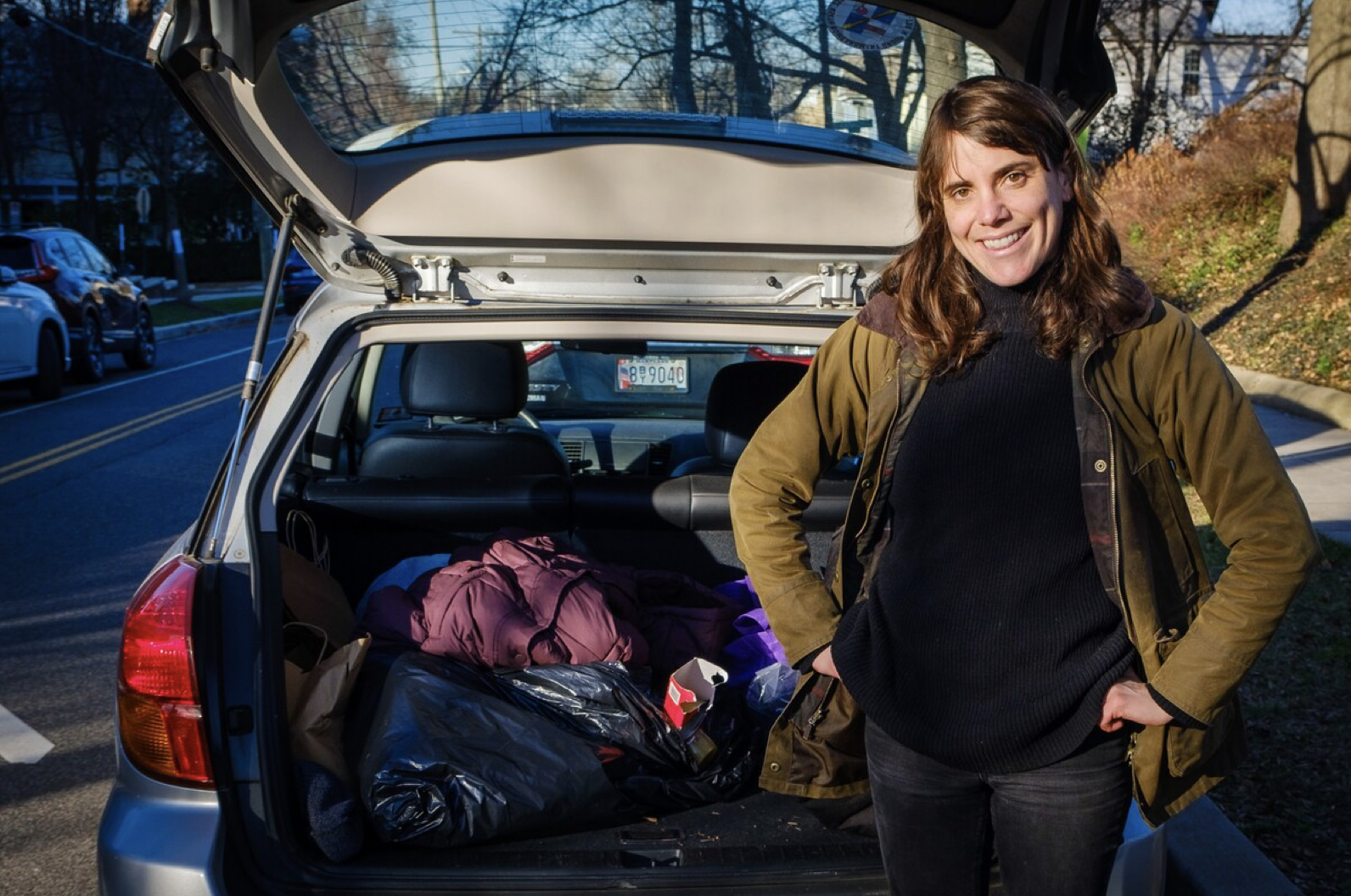Tending to a scattered flock at Friendship Place

Perspective by John Kelly
Columnist
December 19, 2022 at 12:46 p.m. EST
Liza Poris, an outreach specialist with the charity Friendship Place, with some of the items she distributes when checking on unhoused people in Washington. (John Kelly/The Washington Post)
Liza Poris is a bit like a shepherd whose flock is scattered all over Northwest Washington.
Poris is an outreach specialist with the nonprofit Friendship Place. Three days a week — more often in extreme weather — she travels up and down Wisconsin Avenue NW connecting with people who are living outside or who look like they might be. I spent time with her on a recent Tuesday afternoon.
The first place we stop is just behind the Welcome Center Friendship Place operates at 4713 Wisconsin Ave. NW. A few tents are pitched along the edge of Fort Reno Park. Most are empty now, or their inhabitants are zipped inside and stay there as Poris announces her arrival. But inside one is a man who’s been living here about a month, Poris says. She’s been visiting him regularly.
“I remember you said you wanted some food items,” Poris says to him. “I have some hand warmers, too.”
She hands him a paper bag with beef jerky, popcorn, tuna and crackers, hand warmers and face masks.
“Stay warm,” she says.
“I’m trying,” he responds.
Poris goes to her station wagon, which is loaded with blankets, hats, gloves and other essentials. She lifts up a puffy black cylinder. “These are really awesome,” she says. “It’s a jacket and a sleeping bag in one.”
We drive north to Friendship Heights, Poris scanning the street corners and pocket parks as we go. We park off Western Avenue, then walk to the Whole Foods. Poris had seen a man panhandling out front earlier. He’s not here today, so we circle back to the Chevy Chase Metro Building.
Is it hard, I ask Poris, to go up to strangers who are living in the most extreme conditions — who may be gripped by addiction or mental illness — and just start talking to them?
A little, she says.
“You just are the most yourself you can be,” Poris says. “When people see you being human, it allows them to be human.”
Friendship Place is on a mission to help homeless veterans
The goal of outreach is to build a relationship, to form a bond that over time will help usher an unhoused person to the Friendship Place Welcome Center. There, a case manager may be able to aid them on their path toward housing.
Poris knows not everyone will talk with her, not at first anyway.
“I’ve become a more patient person because of this job,” she says.

There is a man standing at a bus stop on Western Avenue, in the shadow of the big Metro bus bays. He’s wearing a torn Washington NFL jacket and a mask, and is next to a wheelchair loaded with bags. Poris introduces herself and explains what she does: checks on people to see if they need anything.
“Do you stay here?” she asks.
The man in the football jacket says he does not. He stays in Greenbelt, he says, though it’s not clear if he’s in a shelter there, in a home or living on the streets. It’s his first time in Friendship Heights and it’s the first time Poris has met him.
She asks if there’s anything he needs: food, a blanket, hand warmers?
He says he’d like a blanket. Poris walks back to her car to get one.
“If he’s going to take a blanket,” she says, “it suggests he might not have a place to stay.”
This interaction might turn into something more. Poris tells him about the Welcome Center, how a nurse practitioner from Unity Health Care comes on Monday afternoons, how there are washers and dryers at Friendship Place, too, in case he needs to do laundry.
Poris doesn’t want to force him, but she mentions that Thursday might be a good day for him to check out the Welcome Center. She’ll be there.
Maybe, he says.
“If I don’t come, you can meet me here,” he adds.
As we walk to the car, Poris says, “I think that went well. It seems like he’s interested. He was making a plan in his head. I’ll have him lead what our relationship will be.”
There are more people to visit — a man who is charging his phone in the lobby of the library near Tenley Circle; a woman who is sitting on a bus shelter bench, her possessions in neatly stacked black plastic file boxes — and Poris checks on each of them.
People who do outreach work say it can take months or years of such encounters before a person is ready to take the next step. These tiny moments build trust.
Poris thinks about the one new person she met today, the man in the football jacket.
“I do hope that he comes by,” she says.
How to help
And I do hope that you will consider donating to Friendship Place, a partner in our annual fundraising drive, The Washington Post Helping Hand.
To give online by credit card, visit posthelpinghand.com. To donate by mail, send a check to Friendship Place, 3655 Calvert St. NW, Washington, DC 20007.






